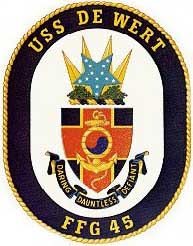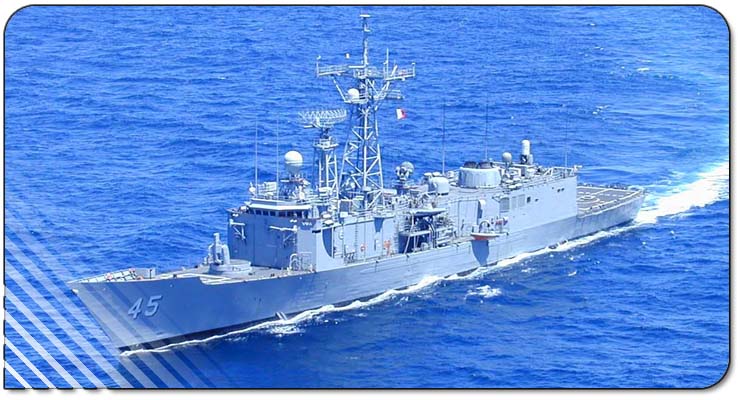Namesake:
Hospitalman Richard De Wert
Richard De Wert was born in Taunton, Massachusetts on 17 November 1931.
He enlisted in the U.S. Navy on 2 December 1948 at the Naval Recruiting
Station, Boston. After basic training at the Naval Training Station,
Great Lakes, Illinois, he attended U.S. Naval Hospital Corps School at
the same location. His initial assignment was to the Naval Hospital,
Portsmouth, Virginia.
On 28 July 1950, Hospitalman De Wert joined the 1st Medical Battalion,
1st Marine Division, Fleet Marine Force, at Camp Pendleton, California,
which deployed to Korea. On 17 December, he landed at Inchon and
assisted in the activation of the division hospital. Within a fortnight
he took part in the liberation of Seoul, the South Korean capital.
On 6 March 1951, after participating in several combat operations, De
Wert was transferred to the 2nd Battalion, 7th Marines. On the morning
of 5 April, "D" Company was advancing up a ridge against stubborn
resistance from Chinese Communist Forces. A marine from the company's
point platoon was wounded, and fell in an exposed position. De Wert
unhesitatingly rushed forward, treated the man's wounds, and carried
him to safety. He then immediately answered a second call for aid,
although himself wounded in the leg.
Ignoring his injury, and despite the warnings of his shipmates, De Wert
moved forward a third time through intense enemy gunfire. Wounded a
second time, in the shoulder, De Wert arrived to find the marine
already dead. Hearing the call of a fourth comrade, De ert again
ignored his own wounds and bravely moved through the exposed area.
While tending to the fourth marine, De Wert was killed by a burst of
enemy machine gun fire.
Hospitalman Richard De Wert was posthumously awarded the Medal of
Honor, which was presented to his mother, Mrs. Evelyn H. De Wert, by
Secretary of the Navy, Dan A. Kimball on 27 May 1952.
|
Mission:
Since 1800, speedy, highly maneuverable, well equipped ships known as
frigates have operated on the high seas of the world. These capable
multi-purpose warships have performed as scouts, messengers, escorts
and ambassadors of their nation's foreign policy. The United States
Navy has an impressive record of producing superb frigates who have
distinguished themselves with outstanding performance. This list
extends from the frigates, Constellation and Constitution, to today's
finest frigate, USS De Wert (FFG-45).
Dewert's mission is to provide air, submarine, and surface
protection for carrier battle groups, underway replenishment forces,
amphibious groups, and convoys. Her unique combination of modern
sensors and advanced weapon systems allow this ship to fight and
survive in the highly complex threat environment of today. Dewert's
Combat Systems capability allows it to rapidly evaluate threats,
conduct rapid appropriate weapons selection, and near instantaneous
response to any postulated attack. The systems aboard this ship have
been designed to meet these demanding and dynamic prerequisites and to
do so with minimum human interface. Her weapons include OTTO Melara 3
inch (76 mm) gun, Vulcan Phalanx close in weapons system (CIWS), and
anti-submarine torpedoes. Dewert is also equipped to carry and embark a
Lamps MK III multi-purpose helicopter. The avionics package, airborne
sensors, and tactical data systems incorporated in this helicopter
allow the ship to locate and strike at hostile surface and subsurface
forces well beyond the horizon and long before Dewert is detected by
their sensors. Rounding our Dewert's Combat Systems suite is the
world's most effective surface passive ASW system thus completing this
highly sophisticated package.
In today's combat environment, the ability to respond quickly and
effectively is the key to success. All of Dewert's systems are designed
to meet this important requirement. Dewert is powered by two (LM 2500)
gas turbine jet engines. The ship's engineering plant utilizes gas
turbine power plant with engines similar to those found on the Air
Force C5-A strategic transport/civilian DC-10 jetliner, and may be
brought "on line" ready to operate in less than one-eighth the time
required for a conventional steam or nuclear powered ship. These
engines provide the ship with a remarkably responsive acceleration rate
and the best capability to react to the needs of the Battle Group
Commander in defense of his forces.
The true heart of this ship, and reason for its ability to meet all of
its assignments, is its crew. High technology state of the art systems
require skilled technicians and professional leadership. These men and
women operate and maintain these systems daily, miles from any external
support or technical assistance. The ship performs and completes its
numerous tasks representing the people of the United States, because
these men and women are dedicated, and today welcome you aboard the
U.S. Navy's finest frigate, USS De Wert (FFG-45).
|
Ship's Crest:
 The Shield:
Dark blue and gold are the colors of
the Navy. The scarlet cross, edged in gold, represents Richard DE
WERT's service as a Hospitalman with the U.S. Marine Corps. The anchor
and globe are adapted from the marine corps emblem, and also symbolize
the world-wide mission of the ship. The taeguk superimposed thereon
denotes DE WERT's service in Korea, where he gave his life. The Shield:
Dark blue and gold are the colors of
the Navy. The scarlet cross, edged in gold, represents Richard DE
WERT's service as a Hospitalman with the U.S. Marine Corps. The anchor
and globe are adapted from the marine corps emblem, and also symbolize
the world-wide mission of the ship. The taeguk superimposed thereon
denotes DE WERT's service in Korea, where he gave his life.
The Crest: The crest
commemorates
Richard DE
WERT's conspicuous gallantry, for which he was awarded the Medal of
Honor, represented by the reversed light blue star. The four rays, for
hope, represent the four times DE WERT courageously exposed himself to
enemy fire to save his wounded shipmates. The small stars represent
valor; the sprigs of oak, strength. The ship's motto "Daring,
Dauntless, Defiant" expresses the courageous sacrifice of DE WERT, and
serves as an inspiration to the men who man the warship named in his
honor.
|

